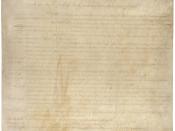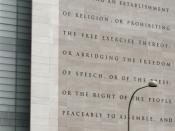The American Citizen's Right to Free Speech
Are we protected from censorship under the First Amendment? In other words do individuals or groups have the right or the power to examine material and remove or prohibit anything they consider objectionable? This argument has been progressing for centuries, in fact the first notable case was against John Peter Zenger, in 1743. Zenger was an editor of a New York colonial newspaper that often published articles critical of the colonial governor. He successfully argued that publishing the truth should be a defense and thus defied the conventional wisdom and ended colonial intrusion into freedom of the press (Harer 21). Since that case, the progression through time has expanded matters to the complicated issues we see today. The founders of the United States government tried to protect this liberty by assuring a free press, to gather and publish information without being under control or power of another, in the First Amendment to the Constitution.
So why do we need to be concerned if we, as citizens, have been properly protected under the constitution? Our concerns occur, on account of special interest groups that are fighting to change the freedom of expression, the right to freely represent individual thoughts, feelings, and views, in order to protect their families as well as others. These groups, religious or otherwise, believe that publishing unorthodox material is an abuse of free expression under the First Amendment. As we will come to find, our Supreme Court system plays an exceedingly important role in the subject of free speech and expression. As well as, understanding that the court system is the nucleus of the construing our First Amendment rights.
First we must focus on the motivation and foundations behind these individuals attempting to challenge the right to free speech. There...


